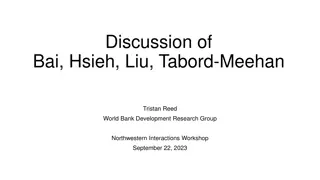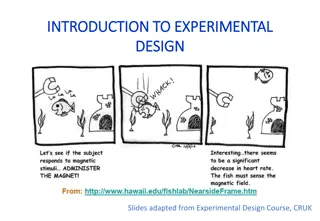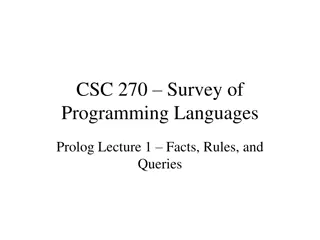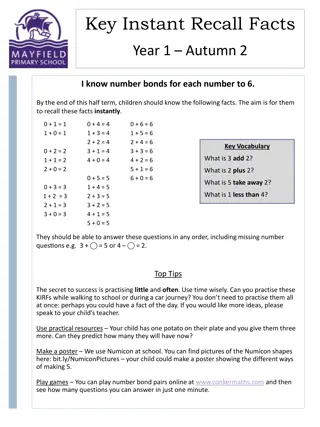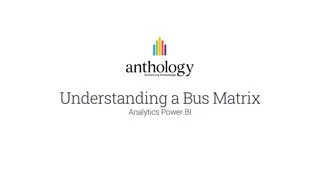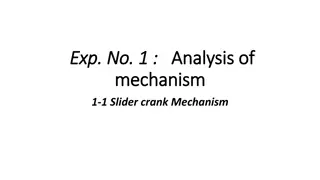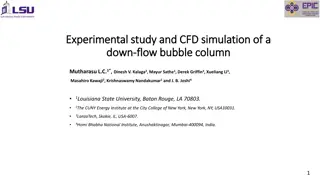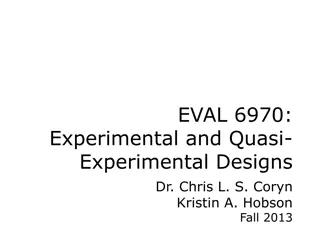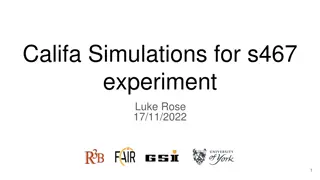Botanical Survey of India and Andaman & Nicobar Islands Conservation Projects
The Botanical Survey of India, Andaman & Nicobar Regional Centre in Port Blair has been actively involved in conservation efforts, including assessment studies and mapping of endemic trees. They have documented various species, collected germplasm, and established experimental gardens. Additionally,
0 views • 55 slides
Introduction to Experimental Economics by John Hey: A Comprehensive Overview
Explore the interconnected realms of Experimental Economics and Behavioral Economics through the insightful lectures of John Hey, an Emeritus Professor at the University of York. Discover the methodology of testing economic theories for validity and the practical applications of experimental economi
1 views • 58 slides
Insights on Experimental ASF Vaccines in Pig Studies
The research conducted by Prof. Jishu Shi and his team at Kansas State University delves into the safety and efficacy testing of experimental African Swine Fever (ASF) vaccines using pigs as the model. Various vaccines, including DNA vaccines and live attenuated viruses, were tested against differen
4 views • 13 slides
Understanding Facts and Opinions in Reading Comprehension
Reading comprehension involves distinguishing between facts and opinions in a text. Facts can be objectively proven, while opinions are subjective reflections of personal feelings. Recognizing the difference is crucial for essay writing and critical analysis. By examining cues and asking specific qu
2 views • 9 slides
Approaches for Impact Assessment at Centurion University, India
Various approaches for impact assessment include Experimental Design, Quasi-Experimental Design, Before-After Comparison, Counterfactual Analysis, Cost-Benefit Analysis, Qualitative Methods, and Mixed Methods. These methods help evaluate the effectiveness and efficiency of interventions by measuring
0 views • 4 slides
Discussion of Randomized Experiments and Experimental Design Challenges
Randomized experiments face statistical power challenges due to rare outcomes and high variance. Stratifying randomization can help control for correlated residual variance based on baseline values of outcomes. Implications for applied economists include addressing attrition and treatment effect het
0 views • 6 slides
Key Components of Experimental Economics Methodology
Experimental economics methodology emphasizes the importance of clear objectives, controlled environments, honest instructions, and providing subjects with monetary incentives. The experimenter must have a clear objective in mind, ensure tasks are clearly stated for subjects, and analyze data accura
0 views • 12 slides
Understanding Generalization: Facts, Opinions, and Validity
Exploring the concept of generalization, this content distinguishes between facts, opinions, and valid generalizations. It emphasizes how generalizations are broad statements based on information and experiences, while facts can be proven true and opinions are belief-based. Key words and examples ar
1 views • 8 slides
Understanding Experimental Design Principles
Explore the key elements of experimental design, from defining clear objectives to controlling for variation. Learn about the consequences of poor design and the importance of factors like replication and variables. Enhance your understanding of statistical analysis and the principles of a well-desi
0 views • 15 slides
Understanding Facts That Need Not Be Proved Under Evidence Act
The Evidence Act discusses Sections 56-58 covering facts that need not be proved, including judicially noticeable facts, admitted facts, and matters presumed to be true. Judicial notice allows courts to accept common knowledge without formal evidence, while Section 58 deems agreed facts as admitted
1 views • 13 slides
Understanding Nonexperimental and Quasi-experimental Studies
Nonexperimental and quasi-experimental studies resemble experiments but lack random assignment, making them valuable for group comparisons without establishing causation. This type of research design looks at differences between groups that already exist, focusing on group differences rather than ca
1 views • 35 slides
Understanding the Difference Between Fact and Opinion
Learn how to distinguish between facts and opinions through clear examples and explanations. Discover how valid opinions can be supported by facts while faulty opinions may exhibit bias. Practice identifying facts and opinions and determining the validity of various statements. Enhance your critical
0 views • 27 slides
Understanding Experiments in Research: Observation vs. Experimentation
Observation and experiments are two crucial methods in research. An observational study involves observing and measuring variables without influencing responses, while an experiment deliberately applies treatments to measure responses. Confounding variables can affect the results, and factors like e
0 views • 13 slides
Understanding Experimental Psychology: Designs and Control Issues in Research
This content delves into the basics of experimental research, focusing on different types of experimental designs and control issues. It covers between-group and within-group designs, discussing advantages and disadvantages, as well as methods for controlling for nonequivalence. The importance of ra
0 views • 26 slides
Understanding Probability: Experimental and Theoretical Concepts
Probability is the measure of the likelihood of an event happening, with experimental and theoretical probability being key concepts. Experimental probability involves determining probabilities through experience or experiments, while theoretical probability can be calculated without prior experienc
2 views • 23 slides
Introduction to Prolog Programming: Facts, Rules, and Queries
Prolog is a powerful logic programming language where programs are built around a knowledge base of facts and rules. It involves three basic constructs: facts (unconditionally true statements), rules (conditionally true statements), and queries to extract information. Creating a knowledge base, quer
0 views • 24 slides
Quiz Review on Scientific Method and Graphing
Explore a quiz review covering topics related to scientific method, graphing, and experimental design. Understand key concepts such as hypothesis, scientific law, theory, variables, and experimental control through detailed questions and images. Test your knowledge on laboratory safety, inferences,
0 views • 14 slides
Query-Driven On-The-Fly Knowledge Base Construction in Advanced Databases
This research delves into the cutting-edge topic of query-driven on-the-fly knowledge base construction, focusing on acquiring facts for a vast array of predicates and capturing billions of facts about entities in the world. Motivated by the limitations of existing knowledge bases, the study explore
0 views • 49 slides
Fun Facts About Bats!
Discover fascinating facts about bats, the only mammals capable of true flight. From their modified hands that form wings to their diverse diets and unique abilities like echolocation, bats are truly remarkable creatures. Find out more interesting bat facts at batweek.org and engage in fun bat activ
0 views • 12 slides
Understanding Quantitative Research Designs in Nursing
Delve into the world of quantitative research in nursing, exploring different research designs and the concept of causality. Learn about experimental, quasi-experimental, and non-experimental designs, as well as the characteristics of experimental design like manipulation, control, and randomization
0 views • 22 slides
Enhancing Math Skills: Instant Recall Facts for Year 4 Students
Improve math skills with key instant recall facts for Year 4 students, focusing on number bonds to 100, multiplication and division facts for the 6 times table, as well as the 9 and 11 times tables. Practice regularly, use games, songs, and chants, and explore helpful strategies to master these fund
0 views • 6 slides
Key Instant Recall Facts for Year 1 Students at Mayfield Primary School
Enhance your child's math skills with these key instant recall facts focusing on number bonds and doubles/halves up to 10. Practice regularly using practical resources, games, and online activities to help children recall these facts instantly. The provided tips and activities aim to make learning f
0 views • 33 slides
Quasi-Experimental and Interrupted Time-Series Designs Overview
Explore the various quasi-experimental designs, control groups, pretests, and outcome patterns in research methodologies. Understand the implications of different outcome patterns on causal interpretation and validity threats in experimental studies.
0 views • 31 slides
Fun Facts and Problems with My Favorite Number 17
Explore a variety of fun facts, word problems, equations, multi-step problems, factor pairs, and more, all centered around the intriguing number 17. Discover interesting facts, solve mathematical equations, and test your problem-solving skills with engaging content featuring the number 17.
0 views • 9 slides
Understanding Experimental Design in Biology
Explore key concepts in experimental design in biology through clicker questions focusing on hypotheses, variables, control groups, and experimental groups. Learn how scientists test hypotheses and analyze results to draw valid conclusions in biological studies.
0 views • 15 slides
Compilation and Evaluation of Experimental Data for Nuclei in Z=2-28 Region
Completed compilation and evaluation of experimental Pn and half-lives for nuclei in the Z=2-28 region, led by Balraj Singh at McMaster University. The work involved preparing lists of neutron-rich nuclides, identifying potential emitters, analyzing available experimental data for 1n, 2n, 3n, and 4n
0 views • 20 slides
Advances in Ceramic Composite Property Modeling and Experimental Characterization
European research focuses on advanced modeling of C/C, C/SiC, and SiC/SiC composites for aerospace and nuclear applications, with an emphasis on correlating simulations with experimental validation. Laboratories are progressing towards a multiscale approach, integrating micro/nanomechanical characte
0 views • 5 slides
What Motivates Paternalism? An Experimental Investigation
Centuries of normative debate on paternalism have resulted in its ubiquity in various aspects of society, from consumer protection to safety regulations. However, there is a scarcity of empirical studies on the motivations behind paternalistic interventions. This experimental investigation delves in
0 views • 12 slides
Year 3 Division Methods and Facts Overview
Explore written calculation methods for division in Year 3, including facts related to times tables such as 2, 3, 4, 5, 8, and 10. Learn about mental division with remainders and progress to dividing numbers up to 4 digits by one- or two-digit numbers using short and long division in Year 4 and 5. D
0 views • 18 slides
Understanding Experimental Studies: Intervention, Characteristics, and Measurements
Experimental studies involve the investigator assigning exposures and following subjects to observe disease development. Different types of experimental studies exist, such as preventive and therapeutic types, each with its limitations, including ethical concerns and challenges in recruiting subject
0 views • 13 slides
Understanding a Bus Matrix Analytics in Power BI
A bus matrix is a two-dimensional visualization in Power BI that shows the intersection of facts (additive amounts) and dimensions (descriptive attributes), enabling relationships between data fields. This concept is crucial for running cross-process analysis efficiently. Star-schema examples demons
0 views • 5 slides
Understanding Research Methods and Data Analysis
This review covers topics such as experimental classification, the comparison of non-experimental and experimental research, software features like JMP and SPSS, outlier handling in data analysis, and levels of measurement in statistical analysis.
0 views • 13 slides
Vietnam Neutrino School Overview
Vietnam School on Neutrino is an annual event started in 2017 to promote experimental neutrino physics in Vietnam. Led by Prof. Jean Tran Thanh Van, the school focuses on lectures, software and hardware training, group works, and excursions. With a mix of students from various countries, the aim is
0 views • 7 slides
Analysis of Slider-Crank Mechanism and Experimental Data
Slider-crank mechanism analysis involves understanding the transformation of input motion into desired output motion. This mechanism consists of a crank, coupler, slider, and ground link, converting circular motion into linear motion. Experimental procedures involve setting crank angles and recordin
0 views • 6 slides
Experimental Study and CFD Simulation of a Down-flow Bubble Column
This study and simulation focus on the experimental setup, measurement techniques, and results of a down-flow bubble column. It explores novel features such as inverted bubbly flow, micro-bubble generation, and gas injection. Detailed analysis includes axial and radial variations of volumetric gas h
0 views • 25 slides
Understanding Experimental and Quasi-Experimental Designs
Explore the foundations of experimental and quasi-experimental designs, delving into causal relationships, counterfactual reasoning, and the importance of validating statistical and internal conclusions. Learn about causes, effects, and the complexity of determining causation in research. Discover R
0 views • 46 slides
Understanding Probability: Learning Outcomes and Examples
This content delves into the study of probability, covering topics such as representing probabilities of simple and compound events, calculating relative frequencies, multi-step chance experiments, theoretical and experimental probabilities. It explains concepts like chance experiments, sample space
0 views • 31 slides
Understanding Experimental Studies in Epidemiology
Epidemiological studies and experimental studies play vital roles in understanding cause-and-effect relationships in research. Experimental studies involve manipulating independent variables and measuring dependent variables, with categories such as true experimental, quasi-experimental, and pre-exp
0 views • 22 slides
Califa Simulations and Experimental Observations in Nuclear Physics Research
Exploring nuclear physics research through Califa simulations and experimental observations with a focus on PID gating, clustering algorithms, beam settings, and Ca isotopes chain gating. The study involves simulating events on CH2 targets, analyzing clustering effects, and observing opening angles
0 views • 10 slides
FY25 LBS Lab OMEGA/OMEGA EP Proposed Campaign
Proposed campaign in FY25 by the LBS Lab to measure specific deliverables, compare results with experimental and theory PIs, collaborate with others, and assess technical issues such as target fabrication feasibility. The campaign involves motivation, relevant milestones, previous/simulated results,
0 views • 6 slides





